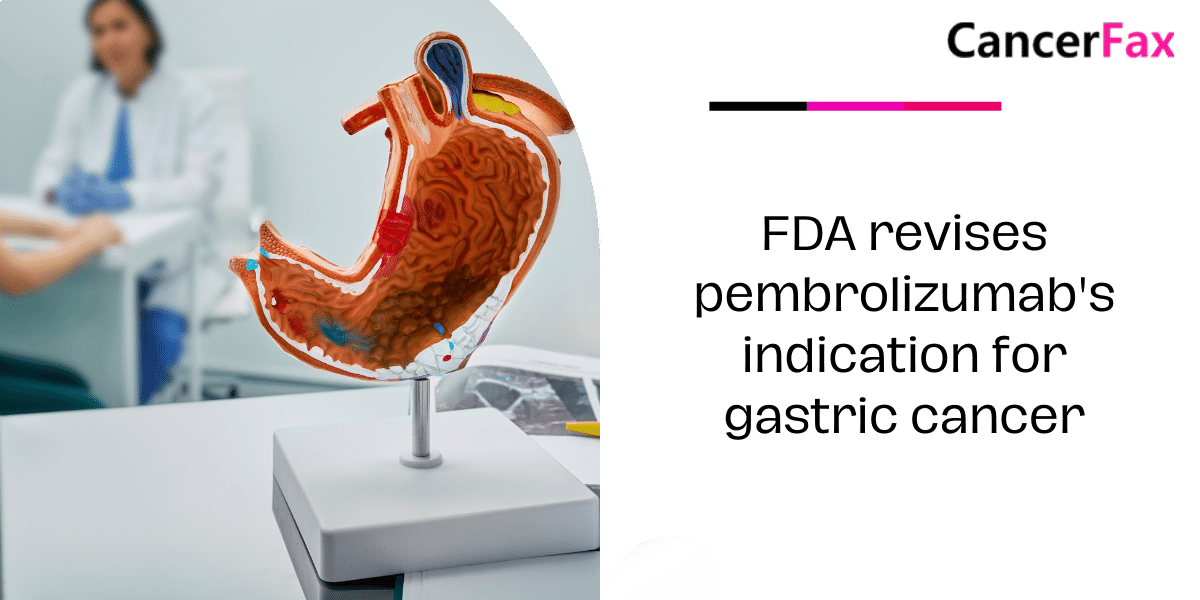FDA revises pembrolizumab’s indication for gastric cancer
The Food and Drug Administration updated the approved use of pembrolizumab (Keytruda, Merck) in combination with trastuzumab, fluoropyrimidine, and platinum-containing chemotherapy for treating HER2-positive gastric or gastroesophageal junction adenocarcinoma that is locally advanced, unresectable, or metastatic in patients who have not received prior treatment. The revised approval limits the use of this indication to patients with tumors expressing PD-L1 (CPS ≥ 1) as detected by an FDA-approved test, while still complying with accelerated approval regulations.
The FDA approved the Agilent PD-L1 IHC 22C3 pharmDx as a companion diagnostic device for identifying patients with gastric or GEJ adenocarcinoma whose tumors have PD-L1 expression (CPS ≥ 1).
The effectiveness was assessed in KEYNOTE-811 (NCT03615326), a study conducted at many centers, where patients with HER2-positive locally advanced or metastatic gastric or GEJ adenocarcinoma who had not undergone systemic therapy for metastatic illness were randomly assigned to receive either the treatment or a placebo in a double-blind manner. Patients were randomly assigned to receive either pembrolizumab 200 mg intravenously or a placebo every 2 weeks along with trastuzumab and either fluorouracil plus cisplatin or capecitabine plus oxaliplatin in a 1:1 ratio.
The primary effectiveness endpoints of KEYNOTE-811 are overall survival (OS) and progression-free survival (PFS). The approval on May 5, 2021, was granted after evaluating the interim analysis of objective response rate (ORR) and duration of response (DOR). ORR and DOR were evaluated in the initial 264 randomized participants at that time. The objective response rate (ORR) was 74% (95% CI: 66, 82) in the pembrolizumab plus chemotherapy group and 52% (95% CI: 43, 61) in the placebo plus chemotherapy group (p-value <0.0001). The median duration of response was 10.6 months (range: 1.1 to 16.5) and 9.5 months (range: 1.4 to 15.4) in the different groups.
An interim analysis of a fully enrolled trial with 698 participants showed that in a subset of 104 patients with PD-L1 CPS <1, the hazard ratios (HR) for overall survival (OS) and progression-free survival (PFS) were 1.41 (95% CI 0.90, 2.20) and 1.03 (95% CI 0.65, 1.64) respectively.
The safety profile of patients treated with pembrolizumab and trastuzumab + chemotherapy in KEYNOTE-811 was similar to the established safety profiles of trastuzumab + chemotherapy alone or pembrolizumab monotherapy.
The suggested dosage of pembrolizumab is 200 mg every 3 weeks or 400 mg every 6 weeks until disease progression, intolerable toxicity, or for a maximum of 24 months. Administer pembrolizumab before trastuzumab and chemotherapy if they are given on the same day.
Dr. Nishant Mittal is a highly accomplished researcher with over 13 years of experience in the fields of cardiovascular biology and cancer research. His career is marked by significant contributions to stem cell biology, developmental biology, and innovative research techniques.
Research Highlights
Dr. Mittal's research has focused on several key areas:
1) Cardiovascular Development and Regeneration: He studied coronary vessel development and regeneration using zebrafish models1.
2) Cancer Biology: At Dartmouth College, he developed zebrafish models for studying tumor heterogeneity and clonal evolution in pancreatic cancer.
3) Developmental Biology: His doctoral work at Keio University involved identifying and characterizing medaka fish mutants with cardiovascular defects.
4) Stem Cell Research: He investigated the effects of folic acid on mouse embryonic stem cells and worked on cryopreservation techniques for hematopoietic stem cells.
Publications and Presentations
Dr. Mittal has authored several peer-reviewed publications in reputable journals such as Scientific Reports, Cardiovascular Research, and Disease Models & Mechanisms1. He has also presented his research at numerous international conferences, including the Stanford-Weill Cornell Cardiovascular Research Symposium and the Weinstein Cardiovascular Development Conference.
In summary, Dr. Nishant Mittal is a dedicated and accomplished researcher with a strong track record in cardiovascular and cancer biology, demonstrating expertise in various model systems and a commitment to advancing scientific knowledge through innovative research approaches.
- Comments Closed
- March 3rd, 2024






FDA label revision 2024, Gastric cancer treatment guidelines, HER2-negative GEJ therapy, Immunotherapy restrictions, Keytruda gastric cancer changes, PD-1 inhibitor updates, Pembrolizumab indication update, Precision oncology adjustments
CancerFax is the most trusted online platform dedicated to connecting individuals facing advanced-stage cancer with groundbreaking cell therapies.
Send your medical reports and get a free analysis.
🌟 Join us in the fight against cancer! 🌟
Привет,
CancerFax — это самая надежная онлайн-платформа, призванная предоставить людям, столкнувшимся с раком на поздних стадиях, доступ к революционным клеточным методам лечения.
Отправьте свои медицинские заключения и получите бесплатный анализ.
🌟 Присоединяйтесь к нам в борьбе с раком! 🌟